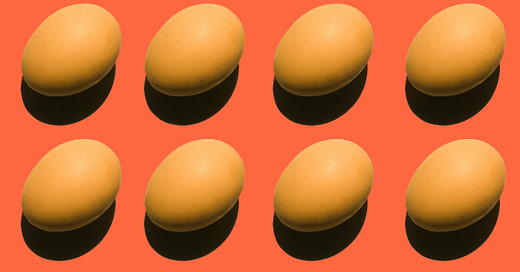It’s Q&A time! You can ask your own question here for a chance to have it answered in an upcoming edition.
In my work I usually try to avoid mentioning certain numbers—weight, calories, grams of carbs or fat—because of our brains’ potential to seize on those details in unhelpful ways. In most cases, if these kinds of numbers appear in podcast interviews or documents I’m referencing, I edit them out or paraphrase in broader terms. But today’s Q&A involves a specific number, and it’s not possible to edit out because it’s at the very heart of the question: Do I really need to eat X amount of protein?
I often skip questions like this to avoid potential triggers, but I thought this one was important to answer because I’ve heard this particular piece of protein advice from multiple sources recently—and I think it has the potential to harm our relationships with food in ways that might not be so obvious at first glance.
The first person to mention it was my hairstylist, who told me her personal trainer had prescribed what sounded like an extreme amount of protein. She was working to build strength to help avoid occupational injury, not to compete as an elite athlete—though even for athletes, it struck me as over-the-top. And she was struggling with it: She talked about choking down foods she didn’t enjoy and wasn’t hungry for, just to meet this staggeringly high protein recommendation.
A few weeks later, I read about a popular lifestyle influencer who was trying to follow this same recommendation. Then I stumbled on a comment section where self-described “protein girlies” were framing the advice as a standard and achievable goal—and painting those who questioned it as purveyors of medical misinformation.
So when I got the question below, I felt called to answer it. Was there any truth to this advice? I had to know. And when I started digging into the science, I became even more curious: where did this advice come from in the first place?
If you’re in recovery from disordered eating and you find specific numbers unhelpful, feel free to skip this one. If you’re interested in unraveling the mystery with me, read on.
As a woman in my early forties, I’m experiencing hormonal body changes (modest weight gain, sore breasts, etc.) and it’s a bit difficult given my eating disorder (anorexic/orthorexia) history. I’ve been hearing many other perimenopausal and menopausal women obsessing about protein—consuming 1 gram of protein per pound of body weight each day—to mitigate muscle loss and such during our later years. Is this another wellness hoax, or is there any relevance to this dietary goal?
FYI: my answers here are for educational and informational purposes only, aren’t a substitute for medical or mental-health advice, and don’t constitute a provider-patient relationship.
First, at the risk of pissing off the protein girlies: that amount of protein is WAY more than most people really need.
Sure, if you enjoy it and it isn’t harming your relationship with food, maybe it’s not a problem. But there’s no good evidence to support eating that much protein, even for elite athletes. Casual exercisers who are just looking to increase strength and reduce aging-related issues (or occupational injuries, like my stylist) only need a fraction of that amount. And forcing yourself to eat a lot more protein than you really need can actually have a lot of similarities with traditional dieting, as we’ll discuss.













